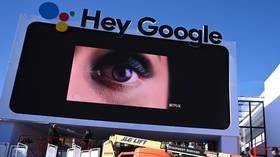Search autocomplete rejigged by Google for political queries, as tech giants become the election meddlers they claim to fight

Google is tightening its autocomplete feature on searches, vowing to remove predictions that support or oppose any political party, and any voting info – even if true. If anyone else did this, it would be called election meddling.
The tech behemoth is clamping down on election-related searches, announcing in a blog post on Thursday it will remove all autocomplete entries that “could be interpreted as claims for or against any candidate or political party.” Statements about “voting methods, requirements, or the status of voting locations” will also be axed – even if they’re 100 percent accurate.
Also on rt.com Liberal bias? Google appears to be hiding search suggestions that cast Black Lives Matter in a negative lightAppearing to grow weary of its self-appointed role as reality’s fact-checker, Google explained that “predictions like ‘you can vote by phone’ as well as ‘you can’t vote by phone,’ or a prediction that says ‘donate to’ any party or candidate,” will not appear in autocomplete at all – regardless of their veracity.
The new rules will be enforced on a preventative basis, meaning Google’s algorithms are tasked with “prevent[ing] violating predictions from appearing,” though humans from the “trust and safety” team will be standing by to identify violations.
The search giant’s insistence on its own political fairness has long elicited smirks, especially after researcher Robert Epstein revealed Google’s search manipulations had the ability to redirect millions of votes to its desired candidates, and leaked emails in 2016 revealed shocked employees engaged in post-election brainstorming to prevent a repeat of President Donald Trump’s victory.
Content creators whose work falls outside the mainstream – from conservative pundits and progressive commentators to alternative medicine professionals – have long alleged that Google suppresses their work, whether through hiding their sites from search results or featuring derogatory Wikipedia snippets and mainstream media hit pieces alongside searches for them. But never before has Google so openly acknowledged the effect of its censorship in suppressing factually unimpeachable information.
It’s certainly a far cry from 2016, when, despite a spike in actual searches for negative terms associated with Hillary Clinton, autocomplete returned only the most glowing results. Back then, Google denied manipulating autocomplete results at all. A company spokeswoman insisted it was merely an automated system filtering “a small set of offensive or inappropriate content,” even though the same terms associated with then-candidate Donald Trump or Clinton’s Democratic rival Bernie Sanders readily surfaced in autocomplete.
Google’s sudden, supposedly nonpartisan sweep of election-related autocompletes comes on the heels of a similarly broad move by its video subsidiary YouTube to remove videos containing “hacked information” that might “interfere with democratic processes” or that could be “shared with the intent to interfere with an election.” The platform did not explain how it planned to identify what information was “hacked,” or how it would analyze the user’s intent before jettisoning their content.
It’s not just Google, of course. Twitter announced on Thursday that it will “label or remove false or misleading information intended to undermine public confidence in an election or other civic process,” including “unverified information about election rigging, ballot tampering, vote tallying, or certification of election results.”
In practice, this could memory-hole the kind of complaints that swept the platform during the primary season about long lines, busted voting machines, closed polling places, and other apparent voter-suppression measures – none of which were “verified,” but all of which were experienced by Twitter users attempting to vote.
Facebook, too, has thrown itself into election-season control of information, vowing to block all new political and “issue” ads a week before the vote itself – no matter how truthful or relevant their content – and tag premature reports of victory with warning labels. “Misinformation about voting,” meanwhile, will be purged with the assistance of state voting authorities, while Messenger users will be unable to mass-forward messages.
Also on rt.com Facebook to BAN new pre-election political ads & label early victory claims in order to ‘limit potential for civil unrest’The social media giant’s CEO Mark Zuckerberg personally urged his platform’s users not to suspect corruption or rigging if election outcomes take “weeks” to be totaled in a recent interview, volunteering Facebook’s services in a “messaging” campaign to convince Americans such an unprecedented delay in returning results is “normal.”
To the average person, the coordinated inauthentic behavior of the social media triumvirate – all of which have arguably made their own electoral preferences clear for November – in suppressing information even they admit is factual might in itself resemble election-meddling. But just try finding that on Google…
Think your friends would be interested? Share this story!















